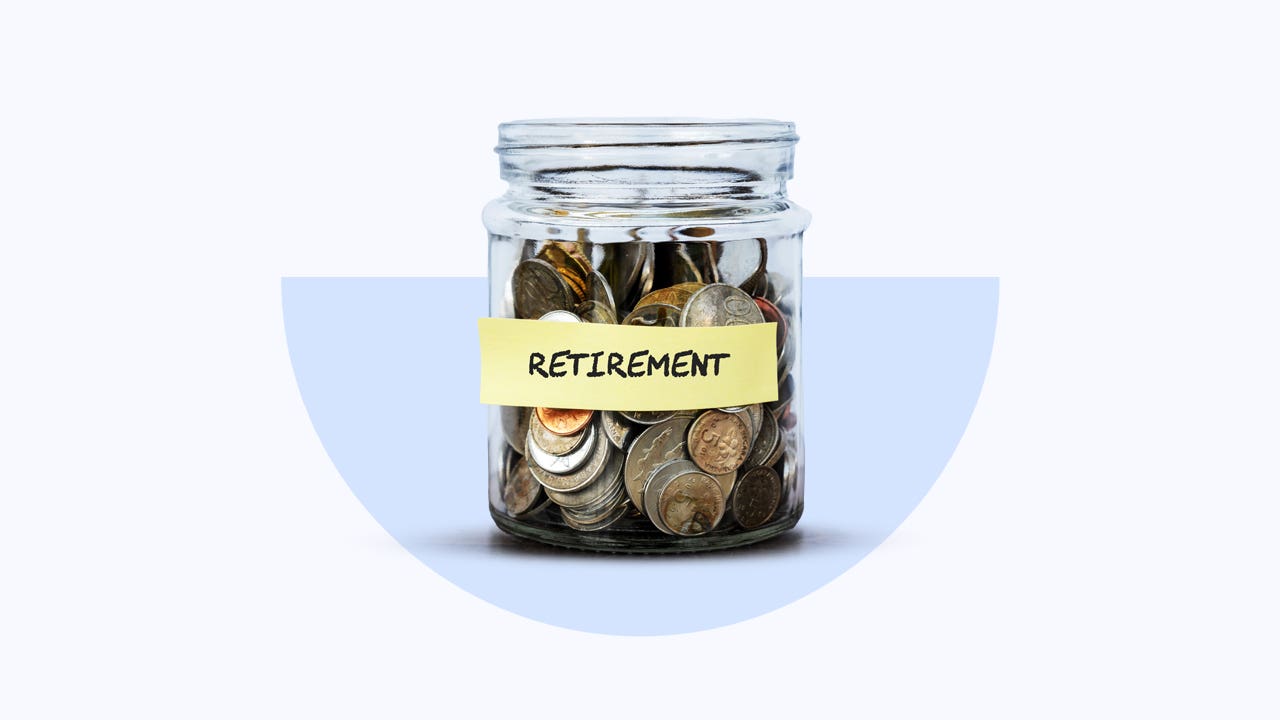How to save for retirement: Key strategies and accounts you need to know

How much money will you need to retire? If you’re like the majority of Americans, you don’t know the answer. But experts use a quick rule of thumb to gauge how much you can spend. They suggest a safe withdrawal amount each year is about 4 percent of your savings, meaning you’ll need about 25 times your annual spending when you hit retirement age. According to Bankrate’s 2024 Retirement Savings Survey, 57 percent of Americans feel behind when it comes to saving for retirement and 35 percent feel significantly behind.
It’s no surprise, then, that 39 percent of working households are at risk of not being able to maintain their standard of living when they retire, according to the National Retirement Risk Index (NRRI) produced by Boston College’s Center for Retirement Research.
There are ways to make sure you stay on track, though. Below you’ll find tips for what you can do to improve your ability to save and what you should be doing today, no matter your age or financial situation.
How much money will you need to retire?
When clients ask Dan Tobias, CEO and certified financial planner at Passport Wealth Management in the Charlotte, North Carolina area, how much they’ll need to retire, he’s quick to redirect the question by asking what retirement looks like for them.
“Are they looking to drive a Lamborghini, or are they looking to move to a 55-plus type condo in Florida?” Tobias asks.
After Tobias understands the person’s retirement vision, he can apply certain rules of thumb. One is seeing what 4 or 5 percent of your retirement savings is – using the classic 4 percent rule – and what your lifestyle would be living off that amount. If that number isn’t on target, you’ll have to either increase your contributions or live more frugally during retirement.
To gauge whether you’re saving enough, Fidelity Investments recommends certain levels of retirement savings as you age.
- For instance, at age 30 you should have at least your annual salary saved.
- By the time you turn 40 years old, you should have saved three times your salary.
- At age 50, you should have six times what you earn annually saved for retirement.
- By the time you hit age 60, the goal is to have eight times your salary saved – and it should reach 10 times your salary by age 67.
Some advisors have different estimates: Bank of America estimated middle-income earners would need to save 9.2 times their salary by the time they’re in their early 60s in order to confidently replace their income.
Bankrate’s retirement calculator can help you get a better idea of how much money you’ll need and whether you may need to work a few more years than expected. But the most important thing is to be realistic about your goals – and don’t underestimate the creeping expenses of being old, especially healthcare costs.
Retirement accounts: Roth IRA vs. traditional IRA vs. 401(k)
Once you’ve committed to saving for retirement, you have a choice of how and where to save. One of the most popular options is the individual retirement account, or IRA. It comes in two major types: the traditional IRA and the Roth IRA.
The big advantage of an IRA is that it provides you a tax break for saving, but it also offers other positives, too, such as tax-deferred growth on your contributions. The specific kind of benefits depend on the type of IRA. Here are the differences between the two main types of IRAs:
Traditional IRA
- Income requirements: Must have earned income. No maximum income, but tax-deductibility may begin to phase out at a modified adjusted gross income of $79,000 in 2025, depending on filing status and whether you’re covered by a plan at work.
- Contribution limits: $7,000 annually in 2025. For investors age 50 and older, the contribution limit is $8,000 — the standard contribution plus a $1,000 catch-up.
- When can funds be withdrawn? Funds can be withdrawn at age 59 ½ or after without penalty.
- Tax benefits: The traditional IRA allows you to deduct your contribution from your income taxes, provided you don’t earn more than the maximum income. Any money in the account can grow on a tax-deferred basis until withdrawn, when it is taxed as ordinary income.
- Early withdrawal rules: Taking money out of a traditional IRA before age 59 ½ will typically result in taxation and may be subject to a 10 percent penalty.
- Required minimum distributions: Yes, after age 73.
Roth IRA
- Income requirements: Must have earned income. Modified adjusted gross income must be less than $150,000 for individual filers in 2025. If it’s more than that or less than $165,000 in 2025, a partial contribution is allowed. The phase-out for married filing jointly begins at $236,000 and ends at $246,000 in 2025. However, workers can still open an account via a backdoor Roth IRA.
- Contribution limits: $7,000 in 2025. Those age 50 and older can contribute up to $8,000 in 2025.
- When can funds be withdrawn? Contributions can be withdrawn at any time, and any amounts (including earnings) may be withdrawn tax-free after age 59 ½, provided the account has been open at least five years.
- Tax benefits: The Roth IRA allows you to invest money after taxes and then take contributions and earnings out tax-free in retirement. Any money in the account can grow tax-free.
- Early withdrawal rules: Contributions can be withdrawn tax-free, but earnings may be taxed and subject to a 10 percent penalty.
- Required minimum distributions: No, you don’t have to worry about those.
These are some of the major differences between the traditional IRA and the Roth IRA, but the plans differ in other key respects, too. It’s important to know which plan works best for you.
401(k)
Another popular option for retirement saving is the 401(k), which is established through your employer. The 401(k) allows you to invest automatically straight from your paycheck, so many people don’t notice that the money is being diverted to their retirement account. The biggest perk of the 401(k) might be the employer match. Many companies match some or all of your contribution to the 401(k), in effect giving you free money in exchange for saving.
Like the IRA, the 401(k) comes in two varieties: a traditional 401(k), where funds are contributed with pre-tax money, and a Roth 401(k), where funds are contributed with after-tax money.
A 401(k) may offer similar benefits to an IRA, but it has some major differences, too.
- Income requirements: No limits on your income, but you must have earned income and an employer that offers the plan.
- Contribution limits: $23,500 in 2025, while workers age 50 and older can contribute an additional $7,500, for a total of $31,000. The catch-up limit in 2025 for people ages 60 to 63 is $11,250 for 401(k) accounts as well as 403(b), governmental 457 and Thrift Savings plans.
- When can funds be withdrawn? Generally, money can be withdrawn without penalties after age 59 ½. For a Roth 401(k), the account must also be open for at least five years to avoid penalties.
- Tax benefits: In a traditional 401(k) you contribute pre-tax money, meaning you won’t pay taxes on your contributions. Any money in the account can grow on a tax-deferred basis until withdrawn and then it’s taxed. The Roth 401(k) uses after-tax dollars, so there’s no immediate tax break, but money can be withdrawn tax-free at retirement age.
- Early withdrawal rules: You may take early withdrawals but will generally pay a tax on any gains as well as a 10 percent bonus penalty. A hardship withdrawal may be possible for an immediate need. Alternatively, your plan may allow you to take a loan against your account.
- Required minimum distributions: Yes, generally after age 73. However, the Roth 401(k) no longer has a required minimum distribution, though the traditional 401(k) still does.
The 401(k) is an attractive addition or alternative to IRA plans, especially because of its much higher contribution amounts, no income limits on participation and the employer match.
Where to start when saving for retirement
With several tax-advantaged options at your disposal – which should you choose? Here’s how experts recommend that you proceed:
- Get any 401(k) match: This employer-sponsored plan should be your top choice if your employer offers any kind of matching funds when you contribute money to the account. An employer match is the easiest, safest way to make money and you should take full advantage of it. Only once you receive this free money should you consider investing in an IRA.
- Max out your IRA: Turn to the IRA if you’ve maxed out your 401(k) match or if your employer doesn’t offer a 401(k) plan or a match. Experts favor the Roth IRA because of all its perks.
- Then max out your 401(k): If you’ve maxed out your IRA and you’re still able to save more, you can turn back to your 401(k) and add more up until the maximum annual contribution.
- Taxable accounts: If you’re able to save even more, then you can add money to a taxable account, perhaps a brokerage account or bank account.
This ordering of your accounts helps you secure a guaranteed return from the employer match before you turn to perhaps the best available retirement account – the Roth IRA. You secure the best perks of each account before moving on to the next.
How to maximize savings on a budget
Even with limited resources, you have ways to maximize your savings so you don’t find yourself underwater later on. Here are some of the most useful methods:
- Set up automatic contributions. If you don’t ever see the money going into your savings, you won’t have the opportunity to miss it. Whether your employer offers direct deposit to multiple accounts or you set your own account to automatically transfer funds into dedicated savings, automatic contributions can be an easy and painless way to integrate savings into your budget.
- Cut down on expenses. Cut back and then you can deposit those extra dollars into your savings account until you begin to hit your goals.
- Focus on the big expense. Forget the scrimping on the occasional coffee: the best place to find savings are your biggest expenses: housing, cars, dining out, travel or whatever you spend big money on.
- Find a side gig. If you don’t see any cost-cutting options, you could instead look into a side hustle. Whether you decide on freelance work, a part-time job or passive income, a few extra hours each week can result in a healthy deposit directly into your savings.
It’s important to integrate saving into your budget now. One of Americans’ biggest financial regrets is not saving for retirement sooner, according to a Bankrate survey. You want to get your money working for you – compounding your gains – as soon as possible.
How to save in your 20s
The irony of retirement savings is that you need to start young. To fully enjoy the power of compound interest you need to maximize the years you give yourself to save. By the end of your 20s, aim to have as much in your retirement accounts as you earn in a year.
Build your emergency fund
Start small. Financial advisors recommend you have six months’ worth of essential expenses stowed away in a high-yield savings account. That’s a rather daunting task for someone just starting out in their career.
You don’t have to get there all at once. Aim for one month’s worth and go from there. If you’re ever in need of cash, an emergency fund will keep you from dipping into retirement accounts, which would cripple your ability to compound gains. Use a safe savings account to make sure your money is there when you need it and score the highest interest rates by shopping around.
Start saving for retirement
Take advantage of your employer’s 401(k) plan
Try to save at least 10 percent of your pay, including any employer match, in a tax-advantaged retirement account, such as a 401(k). About 73 percent of private industry workers had access to a retirement plan through their employer, as of March 2023, but only about 56 percent (of those who have access) used it, according to a September 2023 report from the Bureau of Labor Statistics.
New workers may be auto-enrolled in a retirement plan, a great move except you may be set up to save a smaller portion of your salary — say, 3 percent — than what’s recommended.
Make sure to increase your contribution or at least set up an auto-escalation so that you put in more each year. And above all, make sure you’re getting any free match money from your employer. Here are some other smart moves to make in your 401(k) plan.
How to save without a 401(k)
If your employer doesn’t offer a 401(k) or you’re a part-time worker, consider a Roth IRA. You can save $7,000 in 2025 in after-tax income, but the money grows tax-free and won’t be taxed when you withdraw the funds in retirement.
Alternatively, you can contribute pre-tax income to a traditional IRA — up to the same amount as a Roth IRA each year — and the funds aren’t taxed until you withdraw them.
In order to replicate the simplicity of a 401(k), you can set up your direct deposit to automatically contribute to whichever retirement fund you choose. By directing just $583 of your monthly income to an IRA, you can max out your contributions for the 2025 year.
Start saving early
Let’s assume you start saving $6,000 in a 401(k) annually at age 22 and continue to save that amount until you turn 67. Assuming an annual return of 6 percent, you’ll end up with $1.45 million by the time you reach full retirement age.
Compare that with someone who starts saving a decade later and has only 35 years until retirement. That person will have to save nearly twice as much money each year to end up with the same amount by 67.
Bankrate’s 401(k) calculator will show if you’re on track to reach your retirement savings goals.
Consider upping your allocation to stocks
Play it aggressively by putting a high percentage of your portfolio in stocks. When you’re in your 20s, you have a long investment horizon. That means you can handle the ups and downs of the stock market, and potentially take advantage of its historically high returns, around 10 percent annually over long periods.
This asset allocation calculator shows you how to create a balanced portfolio of investments that fits your time horizon and risk tolerance. Instead of picking individual stocks, many experts recommend that you look to mutual funds, exchange-traded funds or target-date funds to diversify your investment portfolio, reduce your risk and still achieve attractive returns.
How to save in your 30s
By age 35, try to have two times your salary saved in your retirement accounts, on the way to three times that figure by age 40. You’ll want to continue all those good habits you began in your 20s, or shift into high gear if you’re behind.
Ramp up your emergency fund
Your 30s are when you really start to grow up financially. It’s when people typically buy a home, too. The typical age of first-time home buyers in the U.S. was 35 in 2023, according to the National Association of Realtors.
Maturation, though, means you have more to lose. A late mortgage payment is a wholly different situation than missing rent. You don’t want to lose your house, which may increasingly become filled with children. Now is the time to increase that one- to three-month emergency fund to something closer to six months.
Ramp up your retirement savings
This is the time in your life when you start earning real money, making it even more important to save for retirement. If you’ve fallen behind on your 10 percent savings goal, make it up now and don’t be afraid to go even higher.
Now is also the time to take advantage of automatic increases in your retirement savings. You can set up a direct deposit into your retirement fund to increase by a set percentage each year. Since the increased percentage goes into your account automatically, you won’t have the chance to miss it.
You can also begin to stash more of those pay raises into savings, rather than spending them.
Get on the same page as your spouse
Many Americans are getting married around this time of their lives. This means tying yourself to someone, both romantically and financially. The two have a way of affecting each other.
According to a January 2024 Bankrate survey, 42 percent of U.S. adults who are married or living with a partner say they’ve kept a financial secret from their significant other.
More than a quarter of these adults (28 percent) believe that keeping financial secrets from a romantic partner is as bad as physical cheating. Successfully reaching your retirement goals will depend on clear communication with your spouse on all things financial: from the budget to how much to save, and planning for what you want to do in retirement.
How to save in your 40s
Aim for four times your earnings saved by age 45, and six times by age 50. As your income ramps up in this decade, so can your savings rates. And with two decades or more until retirement, you can still take advantage of the power of compounding.
Pay off debt
A number of families may be carrying a credit card balance in their 40s. Eradicating that burden can go a long way to freeing up more money to put toward retirement.
Sign up for a no-fee balance transfer credit card with a lengthy 0 percent interest period so that you give yourself time to pay off the debt. Someone with a $7,000 balance could erase their debt with 15 monthly payments of $467 before interest kicked in.
Once the debt has been paid off and you’re sufficiently used to living without that money, raise your retirement contributions by a similar amount.
Don’t get too conservative
At 40, you’re still a long way from retirement, so don’t play it too safe with your investments, says Ellen Rinaldi, former executive director of investment planning and research at mutual fund company Vanguard.
Rinaldi recommends scaling back stocks to 80 percent of your portfolio and putting the balance in conservative holdings like bonds.
Maintain a broad view of all of your holdings as you reallocate assets. It’s not just enough to focus on the 401(k). Take all of your investments into account. Don’t forget retirement accounts or benefits from previous jobs either. You can roll over an old 401(k) into an IRA or your current employer’s 401(k), and you can invest any way you want.
“It happens all the time — people leave money in a 401(k) and forget about it,” says J. Michael Scarborough, CEO of Retirement Management Systems. “They take more time on their vacation than they do on retirement planning.”
Put college savings in perspective
Hopefully you’ve been saving for their higher education since your kids were in diapers. If so, you’ll be able to keep chipping away without diverting huge sums of cash from your retirement savings. If you’ve neglected to save for college and your 401(k) is less than robust, you may not have enough money to fund both.
Many parents sacrifice their own retirement planning to take care of their kids — even those who have already graduated from college. One Bankrate survey found that 37 percent of Americans have jeopardized their retirement savings to pay for their adult children’s bills — and that can be a big mistake.
“When forced to make a choice, people support their own children first. They’ll put themselves last,” says Merl Baker, partner at NMG Consulting. “They’re reconciled to working longer than they planned or expected to. Or they accept a lower quality of life. It’s pretty powerful.”
If you’re determined to help your child and money will be tight, look for compromises that may have less of a negative impact on retirement savings, such as sending your child to a local, in-state school instead of an expensive private college.
Remember: Your child can take out a loan for college, but you can’t take one out for retirement.
How to save in your 50s
Aim to have savings of seven times your earnings by age 55, and eight by age 60.
Take advantage of catch-up contributions
Turning 50 years old has some advantages, including being able to contribute more to your retirement account with catch-up contributions. In 2025, individuals age 50 or older can save up to $31,000 in a 401(k) and up to $8,000 in an IRA. Take advantage of these opportunities as soon as you’re able.
“It’s not hopeless,” says Dee Lee, certified financial planner professional and author of “Women & Money” while discussing those who have yet to get serious about their retirement savings.
Lee describes a couple who determines that they need to do some belt-tightening. If each contributes $10,000 a year to a 401(k) plan, they’ll have about $90,000 each after seven years, assuming the money grows by 7 percent a year, or a total of $180,000 between them.
But that’s a big assumption. Your portfolio would probably have to be allocated heavily toward stocks and have risen when you need them to. Historically, stocks (as represented by the Standard & Poor’s 500 index) have earned about 10 percent a year, while bonds (represented by the Vanguard Total Bond Market Index Fund) have clipped along at about 1.5 percent over the last decade. If you’re unwilling to invest in stocks, you may well wind up short of your goals.
Those in their 50s, nevertheless, are generally too young to play it too safely.
“This is not the time when you go to cash,” Rinaldi says. “You may stay 50-50 in stocks and bonds. But you’re going to need growth in your portfolio.”
Figure out your retirement budget
How much is enough? That depends on your lifestyle and expenses, potential medical bills and the kind of support you’ll have from, say, a pension plan and Social Security. But as you review your savings goals, be careful not to set the bar too low, thinking you’ll spend less in retirement.
“People typically don’t downsize,” says Harold Evensky, certified financial planner professional and founder of Evensky & Katz/Foldes Financial in Coral Gables, Florida. “It’s not uncommon for them to spend more in retirement than less.”
Fill out a comprehensive retirement expenses worksheet to get a sense of where your money is going when a paycheck is no longer coming in.
To get a more personalized account, contact a fee-only certified financial planner, and make sure they put your needs before their own. Bankrate’s financial advisor matching tool can help you find an advisor in your area.
Plan for medical costs
Safeguard your finances against unexpected medical costs. Some hefty medical bills can quickly eat up a lifetime of savings. A couple in their mid-60s will need $330,000 to cover health care costs in retirement, according to a 2024 Fidelity estimate.
Then there’s the stratospheric cost of extended care at nursing homes. In New York, for example, just one year of care in a nursing home costs an average of $159,000 per person, according to the New York State Department of Financial Services.
With that in mind, retirement planning must include some consideration of future medical costs. One option is long-term health insurance, which pays for extended medical care, including such things as nursing and assisted living — but it can be expensive.
“It has to be easily affordable not just for today but for the whole premium period,” says Marilee Driscoll, founder of Long-Term Care Planning Month, a public-awareness effort that takes place during the month of October.
How to save when you hit retirement age
Once you’ve reached retirement age and it’s time to dip into your savings, there are still ways to save and make the most of your lifetime earnings, stretching them out to cover your whole life.
Use Social Security to your advantage
Social Security benefits can be a major factor in your retirement fund. Based on your birth year, your eligibility for full benefits may vary, but you should look into the best option for you.
For those born in 1960 or later, full retirement age, when you can receive full retirement benefits, begins at 67. Anyone born between 1938 and 1959 reaches full retirement on a varying scale between ages 65 and 67. You can claim Social Security benefits beginning at age 62, but in order to receive full benefits, you must wait until your full retirement age.
Social Security is a valuable addition to your retirement earnings. If you’re unsure when the best time is to claim your Social Security benefits, working with a fee-only financial advisor can help.
Plan your retirement withdrawals strategically
When you begin using the money you’ve saved for retirement, determine the best time to access the funds in each account or plan.
Your tax-deferred accounts such as a traditional IRA or traditional 401(k) will be most efficient when your income tax rate is lower. In contrast, a tax-free account like a Roth IRA or Roth 401(k) will be more beneficial during periods when your income rises, and you can dip into those coffers without increasing your taxes.
Implementing strategies to reduce taxes can help you manage your income more successfully throughout your retirement years.
Note: Bankrate’s Brian Baker also contributed to an update of this story.
Why we ask for feedback Your feedback helps us improve our content and services. It takes less than a minute to complete.
Your responses are anonymous and will only be used for improving our website.








